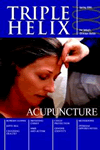'What does it mean to be human?' is a question that has been asked throughout the ages, and definitions are difficult to find. As Pete Moore recognises, 'Any approach to define who I am is doomed from the outset because we will always be more complex than can be catered for by any single definition. It is however, not intractable to investigation once you have broken the subject down into bite-sized pieces, and have admitted that revealing the nature of one aspect of our existence is not the same as describing humanity.'
With this in mind, he explores nine different aspects of human existence – embodiment, consciousness, genetics, history, relationship, materiality, spirituality, sexuality and society – by telling the stories of people for whom a single aspect is especially relevant. For embodiment we read about Arthur White, the reigning world champion power lifter, whose physical ability has been a defining feature of his life. A very different experience is seen in the story of David Bird, who was born with a vascular anomaly surrounding one of his eyes that has profoundly affected the way others view him, and consequently his own self-perception and personal development. The importance of our history is considered through the research of David Barker, whose findings show that our health is radically influenced by the diet and environment that our grandmothers experienced whilst pregnant with our mothers.
Some well-known interviewees, such as Rowan Williams and Mary Warnock, are included in the chapter on spirituality. However, it was the stories of everyday people that really drew me in. These provoked consideration of the various environmental, historical and biological factors that have interplayed to make me who I am today, and how changes to any of these might affect my life. It is, perhaps, this kind of reaction that Pete Moore hopes to produce. Modern scientific thought often reduces us to categories that determine who we are, 'there are two branches in particular that are currently making that sort of claim – genetics and neuroscience.' Pete Moore's aim of 'taking a holistic view of our existence' highlights how limited such a view of humanity is.
The content is not specifically Christian, though some of the interviewees express a Christian faith, and it does not detail philosophical arguments on existence. Rather, there are some interesting insights, engaging stories, and useful overviews of current thought – all of which make this an enjoyable and stimulating read.
































